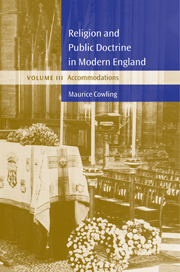Book contents
- Frontmatter
- Contents
- Foreword and acknowledgements
- Introduction
- I The Christian intellect and modern thought in modern England
- 1 The reanimation of Protestantism I
- 2 Christianity and literature I
- 3 The reanimation of Protestantism II
- 4 The enlargement of Christianity
- 5 Christianity and literature II
- 6 Christianity and modern knowledge I
- 7 Whiggism, Liberalism and Christianity I
- 8 Whiggism, Liberalism and Christianity II
- 9 Christianity and modern knowledge II
- 10 Christianity in an unfriendly world I
- 11 Christianity in an unfriendly world II
- 12 Christianity in an unfriendly world III
- 13 Christianity in an unfriendly world IV
- 14 Christianity in an unfriendly world V
- II The post-Christian consensus
- III Conclusion: religion and public doctrine in modern England
- Notes
- Index of proper names
9 - Christianity and modern knowledge II
Published online by Cambridge University Press: 23 December 2009
- Frontmatter
- Contents
- Foreword and acknowledgements
- Introduction
- I The Christian intellect and modern thought in modern England
- 1 The reanimation of Protestantism I
- 2 Christianity and literature I
- 3 The reanimation of Protestantism II
- 4 The enlargement of Christianity
- 5 Christianity and literature II
- 6 Christianity and modern knowledge I
- 7 Whiggism, Liberalism and Christianity I
- 8 Whiggism, Liberalism and Christianity II
- 9 Christianity and modern knowledge II
- 10 Christianity in an unfriendly world I
- 11 Christianity in an unfriendly world II
- 12 Christianity in an unfriendly world III
- 13 Christianity in an unfriendly world IV
- 14 Christianity in an unfriendly world V
- II The post-Christian consensus
- III Conclusion: religion and public doctrine in modern England
- Notes
- Index of proper names
Summary
We can not only hold with Galen and Harvey, and all the great physiologists, that the organs of animals give evidence of a purpose; not only assert with Cuvier that this conviction of a purpose can alone enable us to understand every part of every living thing; not only say with Newton that … ‘the business of natural philosophy is to deduce causes from effects, until we come to the very First Cause, which certainly is not mechanical’: but we can go much further, and declare, still with Newton, that ‘this beautiful system could have its origin no other way than by the purpose and command of an intelligent and powerful Being, who governs all things, not as the soul of the world, but as the Lord of the Universe; who is not only God, but Lord and Governor’
(Rev. William Whewell, The Philosophy of the Inductive Sciences, 1840, vol. II, p. 585)There is, I speak humbly, in common with Natural Science, in the study of living History, a gradual approximation to a consciousness that we are growing into a perception of the workings of the Almighty Ruler of the world; that we are growing able to justify the Eternal Wisdom … [and] that we are coming to see, not only in His ruling of His church in her spiritual character but in His overruling of the world to which His act of redemption has given a new and all-interesting character to His own people, a hand of justice and mercy, a hand of progress and order, a kind and wise disposition ever leading the world on to the better, but never forcing, and out of the evil of man's working bringing continually that which is good.
(Rev. William Stubbs, Inaugural Lecture as Regius Professor of Modern History at Oxford, 7 February 1867, reprinted in Seventeen Lectures on the Study of Mediaeval and Modern History and Kindred Subjects, 1886, pp. 23–4)- Type
- Chapter
- Information
- Religion and Public Doctrine in Modern England , pp. 217 - 246Publisher: Cambridge University PressPrint publication year: 2001



